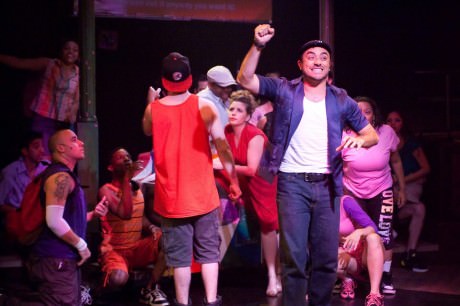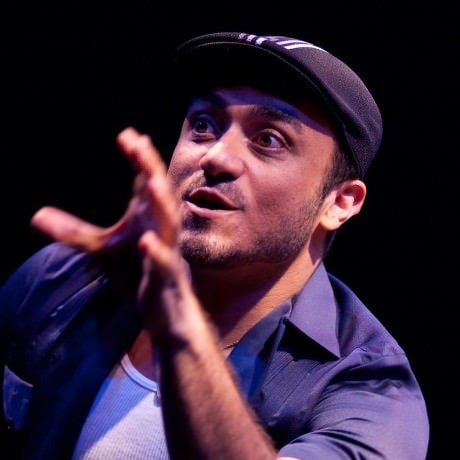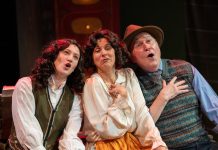Lights up — this time they’re not just going up on Washington Heights, but on the leading actor of Toby’s Dinner Theatre of Columbia’s regional premier production of In The Heights. In Part 1 in a series of interviews with the talented cast, I sat down with local actor David Gregory, who plays the high-energy and rappin’ character Usnavi, who dropped a few beats about how it all goes down in the barrio.

Amanda: What is it that made you want to audition form In The Heights and what was your reaction when you were offered the role of Usnavi?
David: I knew I wanted to do this show when I found out that Toby’s was doing it. I saw it Off-Broadway and then I saw it like 3 or 4 times while it was on Broadway, I’m kind of obsessed with the show, so I was super excited because it was something that wasn’t West Side Story that related to me more personally. It was a show that I felt right for. There are very few Latino focused shows and this is that. I literally had that ‘Oh My God’ reaction because it’s a show out there for us about us by us, and it’s finally something that is just there. And this is such an exciting new show that when I heard— I just knew that I had to go audition for it.
They really put the Usnavis (those that auditioned for the role) through the ringer. There were 5 really super talented people, so it never really felt like a shoo-in, I had no idea that they were going to offer it to me, so much so that my other half got sick of hearing me complain while I waited to hear if I made the part. It’s funny because when Vickie called to offer me the part I actually said “Shut your face.” I was so shocked, I couldn’t believe it. And then the moment I hung up the phone with her it went from “shut your face” to “oh shit” because of what was coming ahead in regards to the rehearsal process. I popped the cast recording CD into the car and it’s been playing there ever since. It was really exciting because the audition was this big rewarding challenge, everything I’d done to win the role had really paid off. And I’m still listening to the CD.
Can you give us a quick breakdown of what life is like in the barrio from Usnavi’s point of view?
It’s never quick in a Latino neighborhood. It’s slow and enjoyable. I think life in the barrio is both frenetic and laid back almost simultaneously. There’s a quick pace but people also just take the time to engage in their relationships and the everyday activities of their lives. Everyone is working to live the American dream, and everyone there in the community has this sense of separation from their “homes.” The coffee doesn’t stop which I think is part of the freneticism, And it’s really tight knit, everyone knows everyone’s business, people are constantly popping into the Bodega just to say hello to Usnavi, they have tabs running with him because everyone is that close to each other. And when something happens, a business closes down, or someone moves out, or comes in, it really does affect everyone— it’s a domino effect. And they have each other’s backs.
Usnavi is the shop owner he’s the Grand Central Station of the neighborhood because everyone goes there; they go there to say hello, to buy their lottery tickets, to get their coffee. Essentially Usnavi is the friendly Latino Mr. Rogers. And he’s also sort of like a Tevye, the narrator from Fiddler on the Roof. The irony of that comparison is that Toby’s Dinner Theatre of Columbia just closed a production of Fiddler on the Roof and the parallels that get drawn between the two characters is incredible. Usnavi deals with all the same themes, tradition, and community and is responsible for upholding those things.
Coming into this as a native Spanish speaker gave you a leg up, yes?
Oh for sure. There are actually quite a few of us that speak Spanish in the cast, and it really helped because we were able to guide the others with pronunciation throughout the rehearsal process. The script is golden because every time there was a Spanish word it would have the English translation for those in the cast that didn’t speak the language. Inflections and pronunciation are super important so being able to offer that assistance was helpful, I think. And I think it gave me a deeper understanding of the script overall.
Are there any characters in the show that remind you of or are similar to people in your life?
Claro que sì! Number one is of course Abuela because Abuela Claudia and Usnavi’s relationship is almost exactly like mine and my Abuela’s relationship, pretty much to the tee. So it’s never difficult for me to find those moments where I can draw an emotional connection between those two characters because I naturally have that relationship. I lived with my Abuela, and although my mom was there, she and I just had that closeness just like Usnavi has. You know, my Abuela had a secret recipe too, condensed milk for coffee and sometimes I’d just skip the coffee and drink the condensed milk; it’s delicious!
A lot of the barrio characters are familiar to me. I grew up going to hair dressers with my mom so there were plenty of Danielas to go around and all with that exact same accent. They were always gossiping about people in the neighborhood just like Daniela does in the show. Throughout the piece, I think everyone can identify with some of these characters because everyone has that goofy relative or friend that they play around with, like Usnavi’s cousin Sonny. And I have childhood friends from Spain that I still keep in touch with, and we act just like Usnavi and Sonny do whenever we see each other.
As an actor with no previous rap experience, what was it like making that transition from singing to rapping?
Oh my lordy. Holy cow. Um…how do I even approach this? It’s such a complex question! I think the easiest part of getting it down was memorizing it – all actors know how to memorize things. But it’s different because part of it was balancing the character’s emotions in the rap so that people understand you. And most important,was making it sound like authentic rap. Trust me, it did not start off sounding that way. In the beginning it sounded like actor David pattering through songs. I worked really closely with Musical Director Cedric D. Lyles and Matt Lampart – our drummer – (who has actually worked with rap artists in recording studios in NYC) to really get a handle on it. They coached me on which words and beats got the emphasis, so that I could get that authentic sound. It was incredibly detailed work to the point where it was so frustrating because I felt like, “Crap I’m never going to get it right.”
When I had first told people that I had accepted the role, everyone’s first reaction was, “Oh congratulations, wait— can you rap?” – which made me wonder, “Are people just born rapping?” Why can’t you learn it like you learn classical singing? It certainly helped to have the confidence of Toby and Larry (my directors) as well as Cedric and Matt really getting me focused on how to do it right. Because I worried, “What if I don’t have that authenticity?’ So it was especially hard work for me, and I just tried as early on as possible to be focused on it because this is sort of thing that if it doesn’t roll off your tongue naturally- you’re doomed to fail. And I think that after all of the hard work we’ve all put into making me sound less like actor David stumbling through these songs, I might just have the hang of it.
How do you think the rap is going to go over with the audience, and are you worried that people might not come to see it because they don’t like this style of music?
It’s always funny to see the reaction of the audience when I first start the show. I’m there opening up the title number, rapping to the audience and making eye contact, and I can just see how most of them have these big wide eyes like ‘Something different is happening/what’s going on. Halfway through the song I get to see their faces transform because they’re getting a taste for it and deciding to ride along with me as I go. It’s a really great thing to experience as they start accepting it.
Personally, I think it’s a complete misconception that this is a ‘rap musical.’ It’s just as much Broadway and showtunes with its love duets and ballads. It’s a musical that has rap and hip-hop infused into it. The musical is a blend of old and new; it’s got showtunes, it’s got rap—it’s like a mash-up. We’re butstin’ that Show-Rap! It rides that fine line of what people are familiar with in musical theatre versus this new sound. And that’s the fun part because when the show is over and they leave they can say “Wow, that was awesome!” And not just wow, but they’ve come to experience something totally unexpected that is great and sad but relatable – even if they weren’t familiar with it to begin with. It’s definitely a contagious style of music, and it makes you want to dance and move along with the cast.
I’ve had 70 and 80 year-olds in the audience come up to me after the show and say that it was so much fun to watch and feel the energy. Not everyone’s ear is used to hearing rap so the trick is to identify the key words and moments and really hit on those. You don’t get every word when listening to modern rap artists so you’re not going to get it here, but as long get those key moments, I think it translates just fine.
Growing up in Spain was your community experience similar or different to that of the Latino American community in Washington Heights?
A little bit of both, actually. It was similar because of the types of characters and the personalities and relationships that we get from the Washington Heights barrio. Like I mentioned the hairdressers and the funny friends that was all the same. Spain was different because everyone there was basically already home, they didn’t have that sense of being removed. Everyone in Washington Heights has this unified thread of being removed from their “homes” because they all come from other Latino countries, the Dominican, Cuba, etc. They’re generationally from somewhere else and so that sense of wanting to return home is ever present. But for me in Spain the connection was already there. So I guess Washington Heights is more culturally diverse because everyone is from somewhere else looking to go back home.
I’m actually experiencing a little bit of that longing for “home” right now because I want to go back to Rota just like Usnavi wants to go back to Playa Rincon. And while I want to go back, I realize that I’m home because this is my home. My life is here, my friends and some family, my job, everything I’ve built for myself is right here. Usnavi and I have that in common.
Do you have a favorite song or moment that really speaks to you?
YYYYAAAAAASSSSSS! The finale. Yeah, the finale, because it brings the show full circle. And it’s also when I can connect most with the cast. In that moment I’m at the point where I’ve established the personal connection with each individual. With everything that’s happening on stage in that moment; emotionally, symbolically, and physically, with everyone just being there it is truly an awesome moment. And I feel that as David the actor and I know Usnavi feels it as that realization dawns on him. I love this moment more than any other moment in the show. I love my cast. This show is by no means a solo piece and that song represents the piece as a whole, it draws the focus to the cast as one unit— that no one could do this piece without that community.
That finale number is also the hardest number to get right because we ran the risk of being false without any real connection and there’s so much happening in that finale number. But Larry and Toby kept pushing us until we got it. It’s an incredible moment because it starts in the with the low-key rap and slowly builds in layers; more voices enter the scene as the characters come into it, it’s a musical build that just ends with this one big final word — “home.” And that’s the defining moment for me.

Is there a scene that Usnavi is not in that really moves you?
think it’s “Breathe” the song that Nina sings at the beginning of the show when she first returns to the Barrio. Her song is a reminder that you have to just take a moment to reflect on life, especially if things are tough in your life. It’s a beautiful overlap of English and Spanish because as Nina is singing in English the ensemble voices and Piragua Guy are singing the exact same words in Spanish and this is one of the only places where you get that simultaneous overlap. And let’s face it, Alyssa V. Gomez sings the crap out of that song so it’s not hard to get entranced. I’m actually on the stage when she’s singing it, sectioned off in my Bodega, but I’m not the scene focus so I actually get a moment to just listen to her sing and take it all in. And it’s so easy to get lost in her singing and then all of the sudden it’s my turn to be doing something and I have to pull myself back out of it.
What’s it like working with such a tight knit cast?
Oh my God, I cannot say enough how much I love this cast! Did I mention that I really love them? Collectively they are my favorite cast that I’ve ever worked with. We’re all super close. And I’m especially close with those actors that Usnavi’s character interacts with on stage. Crystal Freeman, who plays Abuela Claudia, is a close friend of mine, so interacting with her was always fun and super easy. And then Alyssa V. Gomez who plays Nina and Ryan Alvarado who plays Sonny, they actually were living with me for a while during rehearsals and it was amazing. They were staying at my house and we became this little family. We cooked together and we hung out, and it was a real bittersweet moment when they moved out and into their own place. I don’t know if that closeness translates into our on-stage relationships, I really hope it does, but getting to be a part of these people’s lives has just been amazing. Every person involved in this cast is so enthusiastic and they all really want to be there which makes a huge difference. Every single person wants to actively be there as a part of this tight knit group and it makes it the best performing experience every night I’m on stage with them.
What do you hope audiences will take away after seeing In the Heights?
What I want most is for the audience to be able to look back and value what they have in their lives and really appreciate their communities. I want them to be able to appreciate something that is a little out of the norm and out of their comfort zones, and for the audience to kind of get an appreciation for diversity. Thematically, that’s the moral for me, that people who aren’t Latino/Hispanic realize that musically, dance-wise, and theatrically there is something different out there. I want them to push their boundaries and go there, I’m daring them to go there with us and experience that diversity with us, and I hope that they’ll come along for the ride.
LINK
Amanda Gunther’s review of In the Heights.
In The Heights plays through July 21, 2013 at Toby’s Dinner Theatre of Columbia— 5900 Symphony Woods Road, in Columbia, MD. For tickets,call (301) 596-6161, or purchase them online.
https://youtu.be/W0MHaTn5ezc





